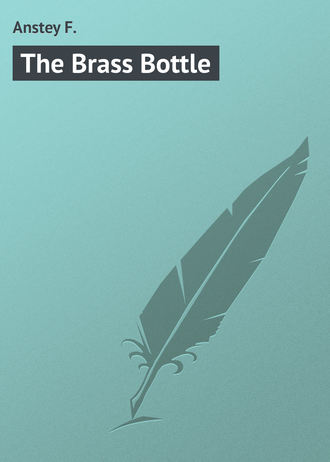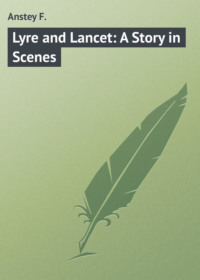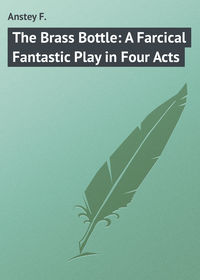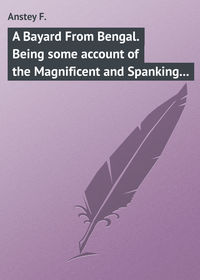 полная версия
полная версияThe Brass Bottle
With this Mr. Wackerbath departed, leaving Horace, as may be imagined, absolutely overwhelmed by the suddenness and completeness of his good fortune. He was no longer one of the unemployed: he had work to do, and, better still, work that would interest him, give him all the scope and opportunity he could wish for. With a client who seemed tractable, and to whom money was clearly no object, he might carry out some of his most ambitious ideas.
Moreover, he would now be in a position to speak to Sylvia's father without fear of a repulse. His commission on £60,000 would be £3,000, and that on the decorations and other work at least as much again – probably more. In a year he could marry without imprudence; in two or three years he might be making a handsome income, for he felt confident that, with such a start, he would soon have as much work as he could undertake.
He was ashamed of himself for ever having lost heart. What were the last few years of weary waiting but probation and preparation for this splendid chance, which had come just when he really needed it, and in the most simple and natural manner?
He loyally completed the work he had promised to do for Beevor, who would have to dispense with his assistance in future, and then he felt too excited and restless to stay in the office, and, after lunching at his club as usual, he promised himself the pleasure of going to Cottesmore Gardens and telling Sylvia his good news.
It was still early, and he walked the whole way, as some vent for his high spirits, enjoying everything with a new zest – the dappled grey and salmon sky before him, the amber, russet, and yellow of the scanty foliage in Kensington Gardens, the pungent scent of fallen chestnuts and acorns and burning leaves, the blue-grey mist stealing between the distant tree-trunks, and then the cheery bustle and brilliancy of the High Street. Finally came the joy of finding Sylvia all alone, and witnessing her frank delight at what he had come to tell her, of feeling her hands on his shoulders, and holding her in his arms, as their lips met for the first time. If on that Saturday afternoon there was a happier man than Horace Ventimore, he would have done well to dissemble his felicity, for fear of incurring the jealousy of the high gods.
When Mrs. Futvoye returned, as she did only too soon, to find her daughter and Horace seated on the same sofa, she did not pretend to be gratified. "This is taking a most unfair advantage of what I was weak enough to say last night, Mr. Ventimore," she began. "I thought I could have trusted you!"
"I shouldn't have come so soon," he said, "if my position were what it was only yesterday. But it's changed since then, and I venture to hope that even the Professor won't object now to our being regularly engaged." And he told her of the sudden alteration in his prospects.
"Well," said Mrs. Futvoye, "you had better speak to my husband about it."
The Professor came in shortly afterwards, and Horace immediately requested a few minutes' conversation with him in the study, which was readily granted.
The study to which the Professor led the way was built out at the back of the house, and crowded with Oriental curios of every age and kind; the furniture had been made by Cairene cabinet-makers, and along the cornices of the book-cases were texts from the Koran, while every chair bore the Arabic for "Welcome" in a gilded firework on its leather back; the lamp was a perforated mosque lantern with long pendent glass tubes like hyacinth glasses; a mummy-case smiled from a corner with laboured bonhomie.
"Well," began the Professor, as soon as they were seated, "so I was not mistaken – there was something in the brass bottle after all, then? Let's have a look at it, whatever it is."
For the moment Horace had almost forgotten the bottle. "Oh!" he said, "I – I got it open; but there was nothing in it."
"Just as I anticipated, sir," said the Professor. "I told you there couldn't be anything in a bottle of that description; it was simply throwing money away to buy it."
"I dare say it was, but I wished to speak to you on a much more important matter;" and Horace briefly explained his object.
"Dear me," said the Professor, rubbing up his hair irritably, "dear me! I'd no idea of this – no idea at all. I was under the impression that you volunteered to act as escort to my wife and daughter at St. Luc purely out of good nature to relieve me from what – to a man of my habits in that extreme heat – would have been an arduous and distasteful duty."
"I was not wholly unselfish, I admit," said Horace. "I fell in love with your daughter, sir, the first day I met her – only I felt I had no right, as a poor man with no prospects, to speak to her or you at that time."
"A very creditable feeling – but I've yet to learn why you should have overcome it."
So, for the third time, Ventimore told the story of the sudden turn in his fortunes.
"I know this Mr. Samuel Wackerbath by name," said the Professor; "one of the chief partners in the firm of Akers and Coverdale, the great estate agents – a most influential man, if you can only succeed in satisfying him."
"Oh, I don't feel any misgivings about that, sir," said Horace. "I mean to build him a house that will be beyond his wildest expectations, and you see that in a year I shall have earned several thousands, and I need not say that I will make any settlement you think proper when I marry – "
"When you are in possession of those thousands," remarked the Professor, dryly, "it will be time enough to talk of marrying and making settlements. Meanwhile, if you and Sylvia choose to consider yourselves engaged, I won't object – only I must insist on having your promise that you won't persuade her to marry you without her mother's and my consent."
Ventimore gave this undertaking willingly enough, and they returned to the drawing-room. Mrs. Futvoye could hardly avoid asking Horace, in his new character of fiancé, to stay and dine, which it need not be said he was only too delighted to do.
"There is one thing, my dear – er – Horace," said the Professor, solemnly, after dinner, when the neat parlourmaid had left them at dessert, "one thing on which I think it my duty to caution you. If you are to justify the confidence we have shown in sanctioning your engagement to Sylvia, you must curb this propensity of yours to needless extravagance."
"Papa!" cried Sylvia. "What could have made you think Horace extravagant?"
"Really," said Horace, "I shouldn't have called myself particularly so."
"Nobody ever does call himself particularly extravagant," retorted the Professor; "but I observed at St. Luc that you habitually gave fifty centimes as a pourboire when twopence, or even a penny, would have been handsome. And no one with any regard for the value of money would have given a guinea for a worthless brass vessel on the bare chance that it might contain manuscripts, which (as any one could have foreseen) it did not."
"But it's not a bad sort of bottle, sir," pleaded Horace. "If you remember, you said yourself the shape was unusual. Why shouldn't it be worth all the money, and more?"
"To a collector, perhaps," said the Professor, with his wonted amiability, "which you are not. No, I can only call it a senseless and reprehensible waste of money."
"Well, the truth is," said Horace, "I bought it with some idea that it might interest you."
"Then you were mistaken, sir. It does not interest me. Why should I be interested in a metal jar which, for anything that appears to the contrary, may have been cast the other day at Birmingham?"
"But there is something," said Horace; "a seal or inscription of some sort engraved on the cap. Didn't I mention it?"
"You said nothing about an inscription before," replied the Professor, with rather more interest. "What is the character – Arabic? Persian? Kufic?"
"I really couldn't say – it's almost rubbed out – queer little triangular marks, something like birds' footprints."
"That sounds like Cuneiform," said the Professor, "which would seem to point to a Phœnician origin. And, as I am acquainted with no Oriental brass earlier than the ninth century of our era, I should regard your description as, à priori, distinctly unlikely. However, I should certainly like to have an opportunity of examining the bottle for myself some day."
"Whenever you please, Professor. When can you come?"
"Why, I'm so much occupied all day that I can't say for certain when I can get up to your office again."
"My own days will be fairly full now," said Horace; "and the thing's not at the office, but in my rooms at Vincent Square. Why shouldn't you all come and dine quietly there some evening next week, and then you could examine the inscription comfortably afterwards, you know, Professor, and find out what it really is? Do say you will." He was eager to have the privilege of entertaining Sylvia in his own rooms for the first time.
"No, no," said the Professor; "I see no reason why you should be troubled with the entire family. I may drop in alone some evening and take the luck of the pot, sir."
"Thank you, papa," put in Sylvia; "but I should like to come too, please, and hear what you think of Horace's bottle. And I'm dying to see his rooms. I believe they're fearfully luxurious."
"I trust," observed her father, "that they are far indeed from answering that description. If they did, I should consider it a most unsatisfactory indication of Horace's character."
"There's nothing magnificent about them, I assure you," said Horace. "Though it's true I've had them done up, and all that sort of thing, at my own expense – but quite simply. I couldn't afford to spend much on them. But do come and see them. I must have a little dinner, to celebrate my good fortune – it will be so jolly if you'll all three come."
"If we do come," stipulated the Professor, "it must be on the distinct understanding that you don't provide an elaborate banquet. Plain, simple, wholesome food, well cooked, such as we have had this evening, is all that is necessary. More would be ostentatious."
"My dear dad!" protested Sylvia, in distress at this somewhat dictatorial speech. "Surely you can leave all that to Horace!"
"Horace, my dear, understands that, in speaking as I did, I was simply treating him as a potential member of my family." Here Sylvia made a private little grimace. "No young man who contemplates marrying should allow himself to launch into extravagance on the strength of prospects which, for all he can tell," said the Professor, genially, "may prove fallacious. On the contrary, if his affection is sincere, he will incur as little expense as possible, put by every penny he can save, rather than subject the girl he professes to love to the ordeal of a long engagement. In other words, the truest lover is the best economist."
"I quite understand, sir," said Horace, good-temperedly; "it would be foolish of me to attempt any ambitious form of entertainment – especially as my landlady, though an excellent plain cook, is not exactly a cordon bleu. So you can come to my modest board without misgivings."
Before he left, a provisional date for the dinner was fixed for an evening towards the end of the next week, and Horace walked home, treading on air rather than hard paving-stones, and "striking the stars with his uplifted head."
The next day he went down to Lipsfield and made the acquaintance of the whole Wackerbath family, who were all enthusiastic about the proposed country house. The site was everything that the most exacting architect could desire, and he came back to town the same evening, having spent a pleasant day and learnt enough of his client's requirements, and – what was even more important – those of his client's wife and daughters, to enable him to begin work upon the sketch-plans the next morning.
He had not been long in his rooms at Vincent Square, and was still agreeably engaged in recalling the docility and ready appreciation with which the Wackerbaths had received his suggestions and rough sketches, their compliments and absolute confidence in his skill, when he had a shock which was as disagreeable as it was certainly unexpected.
For the wall before him parted like a film, and through it stepped, smiling benignantly, the green-robed figure of Fakrash-el-Aamash, the Jinnee.
CHAPTER VI
EMBARRAS DE RICHESSESVentimore had so thoroughly convinced himself that the released Jinnee was purely a creature of his own imagination, that he rubbed his eyes with a start, hoping that they had deceived him.
"Stroke thy head, O merciful and meritorious one," said his visitor, "and recover thy faculties to receive good tidings. For it is indeed I – Fakrash-el-Aamash – whom thou beholdest."
"I – I'm delighted to see you," said Horace, as cordially as he could. "Is there anything I can do for you?"
"Nay, for hast thou not done me the greatest of all services by setting me free? To escape out of a bottle is pleasant. And to thee I owe my deliverance."
It was all true, then: he had really let an imprisoned Genius or Jinnee, or whatever it was, out of that bottle! He knew he could not be dreaming now – he only wished he were. However, since it was done, his best course seemed to be to put a good face on it, and persuade this uncanny being somehow to go away and leave him in peace for the future.
"Oh, that's all right, my dear sir," he said, "don't think any more about it. I – I rather understood you to say that you were starting on a journey in search of Solomon?"
"I have been, and returned. For I visited sundry cities in his dominions, hoping that by chance I might hear news of him, but I refrained from asking directly lest thereby I should engender suspicion, and so Suleyman should learn of my escape before I could obtain an audience of him and implore justice."
"Oh, I shouldn't think that was likely," said Horace. "If I were you, I should go straight back and go on travelling till I did find Suleyman."
"Well was it said: 'Pass not any door without knocking, lest haply that which thou seekest should be behind it.'"
"Exactly," said Horace. "Do each city thoroughly, house by house, and don't neglect the smallest clue. 'If at first you don't succeed, try, try, try, again!' as one of our own poets teaches."
"'Try, try, try again,'" echoed the Jinnee, with an admiration that was almost fatuous. "Divinely gifted truly was he who composed such a verse!"
"He has a great reputation as a sage," said Horace, "and the maxim is considered one of his happiest efforts. Don't you think that, as the East is rather thickly populated, the less time you lose in following the poet's recommendation the better?"
"It may be as thou sayest. But know this, O my son, that wheresoever I may wander, I shall never cease to study how I may most fitly reward thee for thy kindness towards me. For nobly it was said: 'If I be possessed of wealth and be not liberal, may my head never be extended!'"
"My good sir," said Horace, "do please understand that if you were to offer me any reward for – for a very ordinary act of courtesy, I should be obliged to decline it."
"But didst thou not say that thou wast sorely in need of a client?"
"That was so at the time," said Horace; "but since I last had the pleasure of seeing you, I have met with one who is all I could possibly wish for."
"I am indeed rejoiced to hear it," returned the Jinnee, "for thou showest me that I have succeeded in performing the first service which thou hast demanded of me."
Horace staggered under this severe blow to his pride; for the moment he could only gasp: "You —you sent him to me?"
"I, and no other," said the Jinnee, beaming with satisfaction; "for while, unseen of men, I was circling in air, resolved to attend to thy affair before beginning my search for Suleyman (on whom be peace!), it chanced that I overheard a human being of prosperous appearance say aloud upon a bridge that he desired to erect for himself a palace if he could but find an architect. So, perceiving thee afar off seated at an open casement, I immediately transported him to the place and delivered him into thy hands."
"But he knew my name – he had my card in his pocket," said Horace.
"I furnished him with the paper containing thy names and abode, lest he should be ignorant of them."
"Well, look here, Mr. Fakrash," said the unfortunate Horace, "I know you meant well – but never do a thing like that again! If my brother-architects came to know of it I should be accused of most unprofessional behaviour. I'd no idea you would take that way of introducing a client to me, or I should have stopped it at once!"
"It was an error," said Fakrash. "No matter. I will undo this affair, and devise some other and better means of serving thee."
"No, no," he said, "for Heaven's sake, leave things alone – you'll only make them worse. Forgive me, my dear Mr. Fakrash, I'm afraid I must seem most ungrateful; but – but I was so taken by surprise. And really, I am extremely obliged to you. For, though the means you took were – were a little irregular, you have done me a very great service."
"It is naught," said the Jinnee, "compared to those I hope to render so great a benefactor."
"But, indeed, you mustn't think of trying to do any more for me," urged Horace, who felt the absolute necessity of expelling any scheme of further benevolence from the Jinnee's head once and for all. "You have done enough. Why, thanks to you, I am engaged to build a palace that will keep me hard at work and happy for ever so long."
"Are human beings, then, so enamoured of hard labour?" asked Fakrash, in wonder. "It is not thus with the Jinn."
"I love my work for its own sake," said Horace, "and then, when I have finished it, I shall have earned a very fair amount of money – which is particularly important to me just now."
"And why, my son, art thou so desirous of obtaining riches?"
"Because," said Horace, "unless a man is tolerably well off in these days he cannot hope to marry."
Fakrash smiled with indulgent compassion. "How excellent is the saying of one of old: 'He that adventureth upon matrimony is like unto one who thrusteth his hand into a sack containing many thousands of serpents and one eel. Yet, if Fate so decree, he may draw forth the eel.' And thou art comely, and of an age when it is natural to desire the love of a maiden. Therefore be of good heart and a cheerful eye, and it may be that, when I am more at leisure, I shall find thee a helpmate who shall rejoice thy soul."
"Please don't trouble to find me anything of the sort!" said Horace, hastily, with a mental vision of some helpless and scandalised stranger being shot into his dwelling like coals. "I assure you I would much rather win a wife for myself in the ordinary way – as, thanks to your kindness, I have every hope of doing before long."
"Is there already some damsel for whom thy heart pineth? If so, fear not to tell me her names and dwelling place, and I will assuredly obtain her for thee."
But Ventimore had seen enough of the Jinnee's Oriental methods to doubt his tact and discretion where Sylvia was concerned. "No, no; of course not. I spoke generally," he said. "It's exceedingly kind of you – but I do wish I could make you understand that I am overpaid as it is. You have put me in the way to make a name and fortune for myself. If I fail, it will be my own fault. And, at all events, I want nothing more from you. If you mean to find Suleyman (on whom be peace!) you must go and live in the East altogether – for he certainly isn't over here; you must give up your whole time to it, keep as quiet as possible, and don't be discouraged by any reports you may hear. Above all, never trouble your head about me or my affairs again!"
"O thou of wisdom and eloquence," said Fakrash, "this is most excellent advice. I will go, then; but may I drink the cup of perdition if I become unmindful of thy benevolence!"
And, raising his joined hands above his head as he spoke, he sank, feet foremost, through the carpet and was gone.
"Thank Heaven," thought Ventimore, "he's taken the hint at last. I don't think I'm likely to see any more of him. I feel an ungrateful brute for saying so, but I can't help it. I can not stand being under any obligation to a Jinnee who's been shut up in a beastly brass bottle ever since the days of Solomon, who probably had very good reasons for putting him there."
Horace next asked himself whether he was bound in honour to disclose the facts to Mr. Wackerbath, and give him the opportunity of withdrawing from the agreement if he thought fit.
On the whole, he saw no necessity for telling him anything; the only possible result would be to make his client suspect his sanity; and who would care to employ an insane architect? Then, if he retired from the undertaking without any explanations, what could he say to Sylvia? What would Sylvia's father say to him? There would certainly be an end to his engagement.
After all, he had not been to blame; the Wackerbaths were quite satisfied. He felt perfectly sure that he could justify their selection of him; he would wrong nobody by accepting the commission, while he would only offend them, injure himself irretrievably, and lose all hope of gaining Sylvia if he made any attempt to undeceive them.
And Fakrash was gone, never to return. So, on all these considerations, Horace decided that silence was his only possible policy, and, though some moralists may condemn his conduct as disingenuous and wanting in true moral courage, I venture to doubt whether any reader, however independent, straightforward, and indifferent to notoriety and ridicule, would have behaved otherwise in Ventimore's extremely delicate and difficult position.
Some days passed, every working hour of which was spent by Horace in the rapture of creation. To every man with the soul of an artist in him there comes at times – only too seldom in most cases – a revelation of latent power that he had not dared to hope for. And now with Ventimore years of study and theorising which he had often been tempted to think wasted began to bear golden fruit. He designed and drew with a rapidity and originality, a sense of perfect mastery of the various problems to be dealt with, and a delight in the working out of mass and detail, so intoxicating that he almost dreaded lest he should be the victim of some self-delusion.
His evenings were of course spent with the Futvoyes, in discovering Sylvia in some new and yet more adorable aspect. Altogether, he was very much in love, very happy, and very busy – three states not invariably found in combination.
And, as he had foreseen, he had effectually got rid of Fakrash, who was evidently too engrossed in the pursuit of Solomon to think of anything else. And there seemed no reason why he should abandon his search for a generation or two, for it would probably take all that time to convince him that that mighty monarch was no longer on the throne.
"It would have been too brutal to tell him myself," thought Horace, "when he was so keen on having his case reheard. And it gives him an object, poor old buffer, and keeps him from interfering in my affairs, so it's best for both of us."
Horace's little dinner-party had been twice postponed, till he had begun to have a superstitious fear that it would never come off; but at length the Professor had been induced to give an absolute promise for a certain evening.
On the day before, after breakfast, Horace had summoned his landlady to a consultation on the menu. "Nothing elaborate, you know, Mrs. Rapkin," said Horace, who, though he would have liked to provide a feast of all procurable delicacies for Sylvia's refection, was obliged to respect her father's prejudices. "Just a simple dinner, thoroughly well cooked, and nicely served – as you know so well how to do it."
"I suppose, sir, you would require Rapkin to wait?"
As the ex-butler was liable to trances on these occasions during which he could do nothing but smile and bow with speechless politeness as he dropped sauce-boats and plates, Horace replied that he thought of having someone in to avoid troubling Mr. Rapkin; but his wife expressed such confidence in her husband's proving equal to all emergencies, that Ventimore waived the point, and left it to her to hire extra help if she thought fit.









